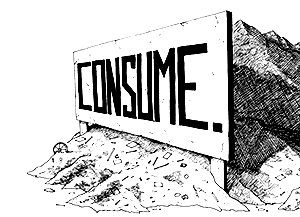Just say no to overconsumption
February 6, 2020
It’s normal to see someone with a closet the size of your apartment and want that lifestyle.
However, we need to remember that overconsumption causes harm to the fashion industry, the workers behind it and the environment.
As consumers, we have the power to change the role of overconsumption in the fashion industry, but it is difficult to be completely unaffected by trends.
Especially in today’s social media-driven world, the power to keep up with constantly changing trends can be overwhelming and nearly impossible to ignore.
With social media apps such as Instagram and YouTube, we see clothing trends pop up all the time.
Many people will resort to fast-fashion brands like H&M and Zara to stay on-trend.
There is an issue with overconsuming not only fast-fashion brands but high-end brands as well.
Reality TV star Kylie Jenner is an example of someone who overconsumes luxury goods; you may have seen her enormous closet that is just for her purses.
There is nothing wrong with buying a few nice bags if that is what you like, but when you have hundreds of bags, it becomes extreme and unreasonable.
Some Italian workers who make pieces for brands such as Fendi and Louis Vuitton are paid close to sweatshop wages.
These are said to be significantly less than 5 to 7 euros an hour, without contracts or insurance, according to a September 2018 New York Times article.
It is shameful that luxury brands such as these who should easily be able to pay their employees living wages choose not to.
Most sustainable brands are not accessible to less wealthy people because they are often a lot more expensive.
However, wealthy people like Jenner have every option to buy ethically and, unfortunately, choose not to.
It is important to note that it is not just Jenner who should make improvements but everyone, including myself.
There used to be two fashion seasons per year, one in spring/summer and one in fall/winter.
Now, there are 52 “micro seasons” a year, according to a March 2019 Business Insider article.
A lot of people have become obsessed with wearing new trends with little care for where they came from.
Just like public views have shifted on plastic straws over the last two years, sparking change in the food industry, the opinions of the general public on the fast-fashion and overconsumption can change.
Consumers and the public have the power to make a change in the industry, and it starts by no longer glorifying unsustainable lifestyles.







